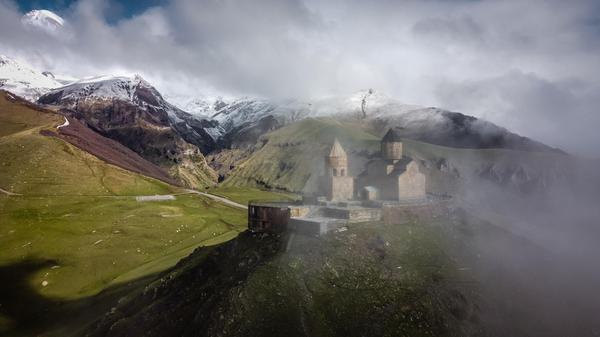Georgia is a small country located at the crossroads of Europe and Asia, with a diverse and fascinating geography that has shaped its history and culture. Bordered by Russia to the north, Turkey and Armenia to the south, and the Black Sea to the west, Georgia's strategic location has made it a meeting point for different cultures and civilizations throughout history. From its high mountain peaks to its stunning coastline, Georgia's geography has something for everyone, making it a unique and exciting destination for travelers.
Physical Geography
Georgia's location and borders have had a significant impact on its geography and history. Situated at the crossroads of Europe and Asia, Georgia is nestled between the Caucasus Mountains to the north and the Black Sea to the west. The country is divided into eleven regions, each with its own unique landscapes and attractions.
The Georgian landscape is diverse and breathtaking, with high mountain peaks, deep river valleys, and a stunning coastline along the Black Sea. The Caucasus Mountains, which run along Georgia's northern border, are home to some of the highest peaks in Europe, including Mount Kazbek and Mount Shkhara.
Georgia's climate and weather patterns are influenced by its location between the Black Sea and the Caucasus Mountains. The country experiences a range of climates, from subtropical along the coast to alpine in the mountains. Summers are generally warm and humid, while winters can be cold and snowy, especially in the higher elevations.
Human Geography
Georgia's population and demographics are as diverse as its geography. With a population of approximately 3.7 million, Georgia is home to a mix of ethnic and cultural communities. The majority of Georgians are ethnic Georgians, but there are also significant communities of Armenians, Azeris, and Russians.
Georgia's major cities and urban areas are hubs of activity and culture, with a mix of modern amenities and historic landmarks. The capital city of Tbilisi is a vibrant and cosmopolitan center of art, culture, and nightlife. Other major cities, such as Kutaisi, Batumi, and Rustavi, offer a mix of old-world charm and modern development.
Georgia's rural areas and traditional communities offer a glimpse into the country's ancient past and rich cultural heritage. Many villages and towns throughout the country have preserved traditional crafts, such as pottery and weaving, and offer visitors a chance to experience life in rural Georgia. Homestays and guesthouses in these communities provide an authentic and immersive travel experience.
Natural Resources
Georgia is rich in natural resources, but many of them are underexploited. The country has reserves of coal, oil, and natural gas, but their exploitation has been limited. The agricultural sector is a major contributor to the economy, with crops such as grapes, hazelnuts, and tea being significant exports. Livestock, including cattle and sheep, are also raised in rural areas.
Georgia's natural landmarks are a major draw for tourists, with a range of national parks and protected areas offering stunning landscapes and unique wildlife. Some of the most popular natural landmarks in Georgia include the Kazbegi National Park, the Colchis Wetlands and Forests, and the Prometheus Caves.
In addition to its mineral and agricultural resources, Georgia is also rich in water resources, with several major rivers flowing through the country, including the Mtkvari, Rioni, and Alazani. These rivers provide important habitats for fish and other wildlife, as well as recreational opportunities for visitors.
Economic Geography
Georgia's economy has undergone significant changes since gaining independence in 1991, transitioning from a centrally-planned economy to a market-oriented one. The country's major industries include energy, agriculture, tourism, and manufacturing.
Georgia's trade relationships and economic partnerships are critical to its economic growth. The country has forged economic partnerships with the European Union, the United States, and other countries in the region. Georgia is also a member of the World Trade Organization and has signed free trade agreements with several countries.
Transportation infrastructure is an important aspect of Georgia's economic geography. The country has a well-developed transportation network, including highways, railroads, and ports. The Baku-Tbilisi-Ceyhan pipeline, which transports oil from the Caspian Sea to the Mediterranean, is a major transportation infrastructure project that has helped to boost Georgia's economy. The Anaklia Deep Sea Port, currently under construction, is expected to further strengthen Georgia's transportation infrastructure and increase its trade capacity.
Cultural Geography
Georgia's cultural geography is diverse and rich, reflecting the country's long and complex history. The country is home to a mix of ethnic and cultural communities, including Georgians, Armenians, Azeris, and Russians, among others.
Georgia's historic landmarks and cultural heritage sites are significant not only for their historical and architectural value, but also for their cultural significance. Some of the most popular cultural heritage sites in Georgia include the ancient city of Mtskheta, the Bagrati Cathedral and Gelati Monastery, and the cave monasteries of Davit Gareja.
Georgia's traditional crafts and cultural traditions are an important part of the country's cultural heritage. Traditional crafts such as pottery, weaving, and woodcarving have been passed down through generations, and many rural areas still practice these crafts today. Georgian polyphonic singing, a unique and ancient form of choral singing, has also been recognized by UNESCO as an intangible cultural heritage of humanity.
Conclusion
Georgia's geography offers a wide range of unique and diverse experiences to visitors. From skiing in the mountains to enjoying the beaches along the coast, there is something for everyone.
However, it is crucial to preserve Georgia's natural and cultural heritage for the tourism industry to thrive. This includes protecting the country's natural resources and habitats, preserving historic landmarks and cultural traditions, and promoting sustainable tourism practices. By doing so, Georgia can continue to attract visitors from all over the world and provide them with a truly authentic and unforgettable experience.
















